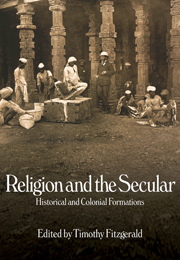Book contents
- Frontmatter
- Dedication
- Contents
- Acknowledgements
- Contributors
- Introduction
- 1 Dialectics of conversion: Las Casas and Maya colonial Congregación
- 2 A higher ground: the secular knowledge of objects of religious devotion
- 3 Secularizing the land: the impact of the Alaskan Native Claims Settlement Act on indigenous understandings of land
- 4 The formative process of State Shinto in relation to the Westernization of Japan: the concept of ‘religion’ and ‘Shinto’
- 5 Religious and secular in the Vietnam War: the emergence of highland ethno-nationalism
- 6 Colonialism all the way down? Religion and the secular in early modern writing on south India
- 7 Understanding politics through performance in colonial and postcolonial India
- 8 Real and imagined: imperial inventions of religion in colonial southern Africa
- 9 Religion in modern Islamic thought and practice
- 10 Rudolf Otto, cultural colonialism and the ‘discovery’ of the holy
- 11 Encompassing Religion, privatized religions and the invention of modern politics
- 12 Colonialism and the myth of religious violence
- Index
7 - Understanding politics through performance in colonial and postcolonial India
- Frontmatter
- Dedication
- Contents
- Acknowledgements
- Contributors
- Introduction
- 1 Dialectics of conversion: Las Casas and Maya colonial Congregación
- 2 A higher ground: the secular knowledge of objects of religious devotion
- 3 Secularizing the land: the impact of the Alaskan Native Claims Settlement Act on indigenous understandings of land
- 4 The formative process of State Shinto in relation to the Westernization of Japan: the concept of ‘religion’ and ‘Shinto’
- 5 Religious and secular in the Vietnam War: the emergence of highland ethno-nationalism
- 6 Colonialism all the way down? Religion and the secular in early modern writing on south India
- 7 Understanding politics through performance in colonial and postcolonial India
- 8 Real and imagined: imperial inventions of religion in colonial southern Africa
- 9 Religion in modern Islamic thought and practice
- 10 Rudolf Otto, cultural colonialism and the ‘discovery’ of the holy
- 11 Encompassing Religion, privatized religions and the invention of modern politics
- 12 Colonialism and the myth of religious violence
- Index
Summary
Religion has always been a looming presence in understandings of Indian politics in the colonial and postcolonial periods. Much scholarly time and trouble has been spent examining the way religion operates, and what its presence means for the development of Indian political structures. The classic dichotomy between the religious and the secular spheres underpins this concern. This is particularly so, of course, in recent times, as the polity has come to be dominated increasingly by forces claiming to represent specific religious identities. The state election result in Gujarat late in 2002, for example, was proclaimed a victory for Hindutva, for ‘Hindu-ness’ and the ‘Hindu community’ as it has been invoked by the Bharatiya Janata Party (BJP) and its allies. It was another nail in the coffin of the secular polity.
Ironically this development is occurring precisely at a time when the idea of religion is being questioned as a viable, discrete category for understanding certain cultural systems, particularly in a non-Western framework. In his recent book The Ideology of Religious Studies (2000), Tim Fitzgerald has argued that the category ‘religion’ developed in the particular context of post-Enlightenment Europe as a facet of capitalist development. The emergence of the rational, secular public marketplace invoked the idea of a mystical, private sphere of religion. Our understanding of the dichotomy between the religious and the secular is configured by this development.
- Type
- Chapter
- Information
- Religion and the SecularHistorical and Colonial Formations, pp. 135 - 152Publisher: Acumen PublishingPrint publication year: 2007

